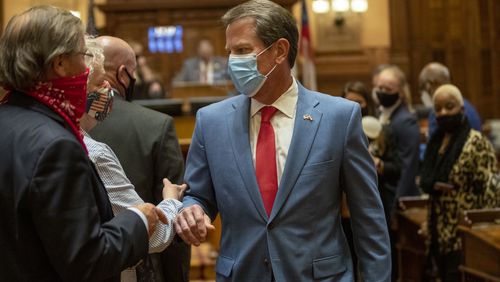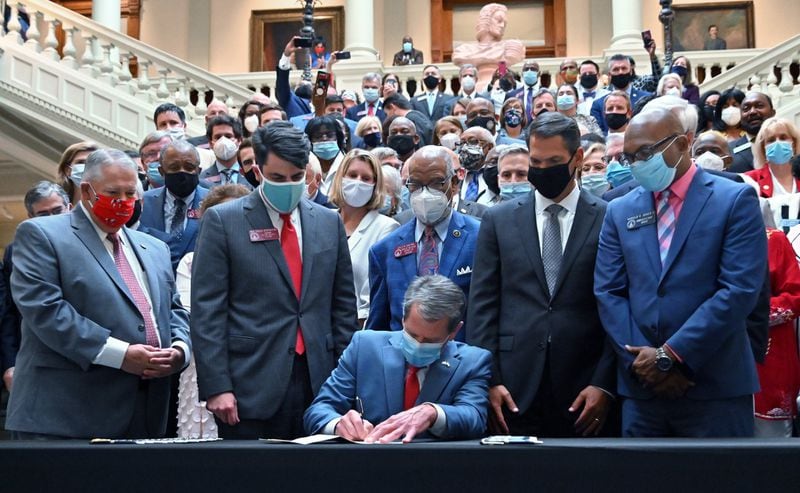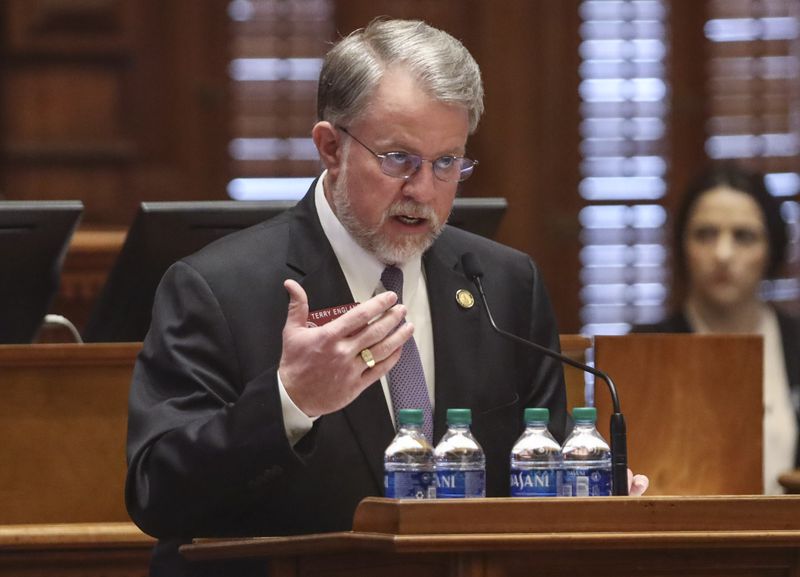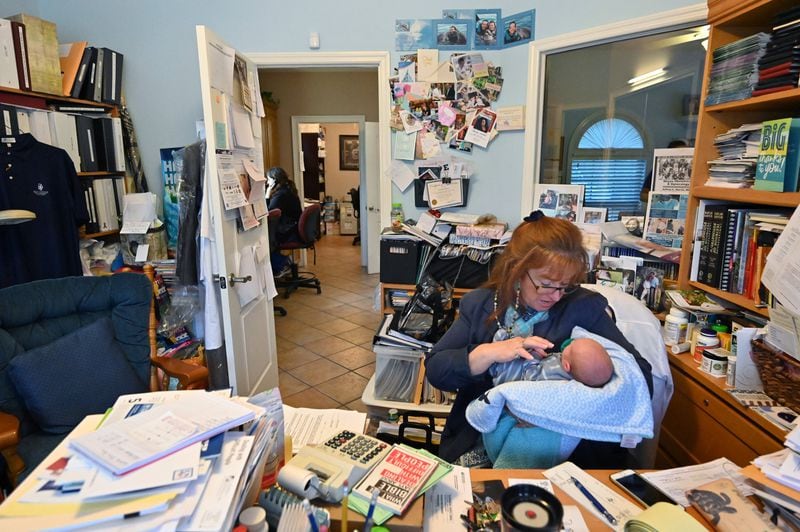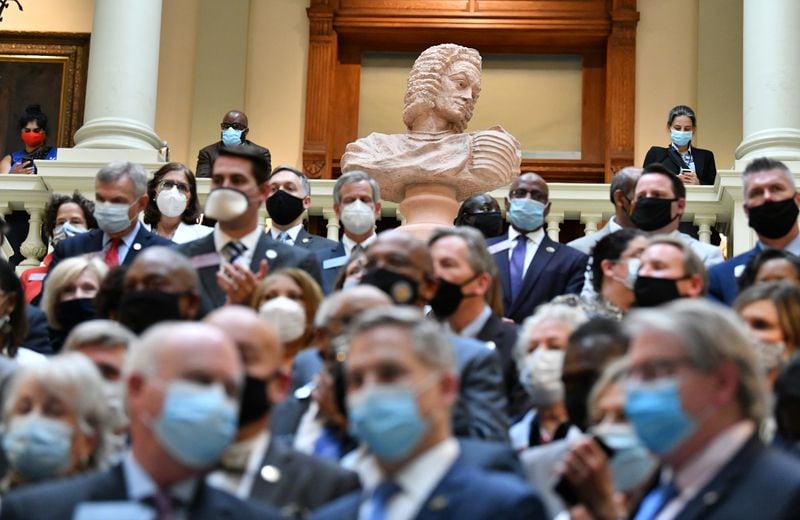The end of the pandemic-delayed legislative session kicks off the start of a 40-day window for Gov. Brian Kemp to decide which measures he’ll sign into law and which he’ll scuttle.
The Republican wasn't shy about using the red pen last year when he nixed 14 measures, including one that would have required elementary schools to schedule recess each day.
This year, Kemp has already signed a landmark hate-crimes legislation spurred by the protests over police brutality and racial equality that have spread across Georgia and the nation.
But he must decide by Aug. 5 whether to approve dozens of other measures, including proposals to give police officers more legal protections, improve accountability in Georgia's senior care homes, limit unexpected medical bills and permit grocers and others to make home deliveries of alcohol.
He also inked a $26 billion spending plan that slashed funding for education and other programs but avoided furloughs and deeper cuts.
Here’s a closer look at the top measures that passed the General Assembly:
Hate crimes
A long-stalled measure to impose additional hate-crimes gained traction at the Capitol after graphic video emerged of the shooting death of Ahmaud Arbery, a Black man from Glynn County killed by a gunman who prosecutors say used a racial epithet.
House Bill 426 allow enhanced criminal penalties to be levied against those who target their victims on the basis of race, gender, sexual orientation, sex, national origin, religion, or physical or mental disability.
Will Kemp sign it? He already has, putting his signature on the legislation while surrounded by a bipartisan group of supporters on the final day of the legislative session.
Police protections
As part of the compromise for hate-crimes legislation, Republicans demanded the passage of House Bill 838, which creates the new offense of "bias motivated intimidation" of a police officer or other first responder.
While the hate-crimes legislation was overwhelmingly approved by a bipartisan majority of the Legislature, this more polarizing proposal passed on a party-line vote over the objections of Democrats who saw it as unnecessary and tone-deaf at a time of protests over police brutality.
Will Kemp sign it? On a political basis, Kemp seems assured to support it. But civil rights groups and legislators have raised concerns that it could weaken protections for police officers in some cases and have other unintended consequences.
The budget
Aside from the hate-crimes legislation, Georgia's spending plan was the other big debate of the coronavirus-interrupted session reboot. The $26 billion plan includes 10% spending cuts, but no furloughs for state employees.
The budget was spared deeper cuts in the session's final hours by a slightly more optimistic revenue estimate and Kemp's decision to pour about $250 million in reserve funds into the state budget.
“If there’s ever been a time to use the rainy day fund,” Kemp said, “it’s right now.”
Will Kemp sign it? Of course. It's the only thing lawmakers are legally required to accomplish, and they faced a July 1 deadline to adopt the measure to finance state government. He approved it on June 30.
Senior care homes
The legislation, House Bill 987, was adopted by lawmakers to bring dramatic changes to the state's assisted living communities and large personal care homes after a series in The Atlanta Journal-Constitution exposed widespread neglect and abuse.
Memory care units would have to get certified and have more staff, directors would have to be licensed and homes that break the rules would face higher fines. Assisted living homes would be required to have nurse staffing. Homes would also have to disclose financial problems to residents and families.
Will Kemp sign it? The governor signed it on June 30.
Credit: HYOSUB SHIN / AJC
Credit: HYOSUB SHIN / AJC
Maternal mortality
Georgia lawmakers overwhelmingly approved House Bill 1114, which cleared the way to extend Medicaid for low-income mothers from two to six months postpartum.
The legislation beefs up care for the state's poorest women during a critical time when conditions like postpartum depression and high blood pressure can be fatal when left untreated, and lawmakers scraped together enough money to finance the extension.
Georgia’s maternal mortality rate has long ranked among the bottom of U.S. states, and a bipartisan state study committee recently found that 60% of the state’s maternal deaths between 2012 and 2014 were preventable.
Will Kemp sign it? He's seen as a cinch to approve it, and Georgia Republicans say they'll make it a key part of their 2020 election argument.
Surprise billing
After years of debate, lawmakers approved a measure aimed at protecting patients from receiving many, though not all, unexpected medical bills when they're unknowingly treated by out-of-network doctors in an emergency situation.
Will Kemp sign it? It's very likely. The governor hasn't said specifically whether he backs House Bill 888, but he's urged lawmakers to rein in a billing system that is "rigged against them."
Credit: Bob Andres
Credit: Bob Andres
Alcohol delivery
Another perennial battle was put to rest this year after legislators gave final approval to House Bill 879, which lets grocery retailers, liquor stores and some restaurants deliver beer, wine and booze to the front doors of their customers.
Will Kemp sign it? He hasn't said definitively, but he'll have a lot of angry retailers to stomach if he decides against it.
Business liability
After some end-of-session drama, lawmakers approved a measure to limit the ability of people to sue businesses and health care providers if they are diagnosed with COVID-19.
Senate Bill 359 would shield companies from legal liability unless they show "gross negligence, willful and wanton misconduct, reckless infliction of harm, or intentional infliction of harm."
Will Kemp sign it? He's under pressure from pro-business groups to ink the measure.
Human trafficking
The legislation, known as the Survivors First Act, would let victims of human trafficking vacate crimes they committed under duress. Senate Bill 435 also allows authorities to revoke the commercial drivers' licenses for those convicted of facilitating the trafficking.
Will Kemp sign it? If not, he has plenty of explaining to do. His wife, Marty Kemp, has made the proposal a top priority.
Credit: HYOSUB SHIN / AJC
Credit: HYOSUB SHIN / AJC
Legislative pay cut
In a show of camaraderie with state agencies facing sharp cuts cuts, Georgia lawmakers voted to slash the salary of its members and the lieutenant governor for the 2021 fiscal year. Senate Bill 416 trims pay for members of the General Assembly by 10% and for Lt. Gov. Geoff Duncan by 14%.
Will Kemp sign it? It's hard to imagine he won't, and fellow Republicans have already made clear it's an important part of the party's 2020 strategy.
Tax issues
The governor has a slate of tax proposals to consider. House Bill 1037 would require all film projects to undergo audits before they can claim lucrative tax credits. Senate Bill 375 would impose state taxes on vaping products. And House Bill 105 requires a 50-cent per-ride tax on taxis and ride-hailing services.
Will Kemp sign them? The film tax audit seems likely, but he's said little about the other tax proposals.
Constitutional amendments
After Kemp vetoed legislation that would have restored citizens' ability to sue their government over unconstitutional laws, lawmakers adopted House Resolution 1023, which proposes a constitutional amendment that would allow them to do so.
And Georgia lawmakers gave final approval to an “anti-bait-and-switch” constitutional amendment that allows lawmakers to dedicate fees collected to the causes they promised they would finance.
House Resolution 164 aims to limit the ability of state officials to divert fee money meant for things such as cleanups for tire dumps, landfills and hazardous waste sites.
Will Kemp sign it? No, because he doesn't have to. The measures are constitutional amendments, which means once they pass the Legislature, it's up to voters to decide whether to approve them in a November referendum.
About the Author

